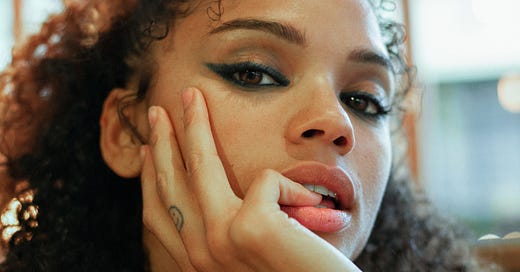Portia Ferrari: “The Black experience is a spectrum”
The creator on different experiences of identity and reflecting on past anxieties
Hi, welcome back to Mixed Messages! This week I’m speaking to actor, presenter and creator Portia Ferrari, who is mixed Black and white. When it comes to identity, Portia wouldn’t call herself a Black woman, but thinks it’s important to hold space for mixed people who do – while also dismantling white supremacy, of course.
How do you define your ethnicity?
I’m half-Black, and would define myself as a mixed-race woman. All I really know is I’m African-American Cherokee and that my mum is English descended from Hungarian gypsies.
When I was younger, I had a lot of mixed emotions about my identity, but calling myself mixed-race was one thing I could confidently assert about myself. I hate labels that put us into boxes, we are so much more than we can even comprehend, but I understand the importance of them.
Have you always been comfortable with the way you look?
Not always – when I was younger I was influenced by eurocentric ideals of beauty and used to straighten my hair. When you’re a girl, you just want to fit in, and at that time it was a trend to have straight hair. I just wanted to feel cute! At one point, I chemically straightened my hair and made a mess of it, so I had to cut it off and start all over again. Now, I can rock my natural hair. It’s been a real journey.
Do you think a lack of representation affected how you felt about your appearance?
I definitely never felt cute without seeing people who looked like me. There were no examples to influence me to embrace myself, except Mel B from The Spice Girls. With my mum being white, not having a Black woman around is a different experience for a mixed-Black girl.
I get treated differently depending on whether I’m pale and not wearing a tracksuit to when I’ve been in Mexico for two months with my hair braided. Whenever I look more ‘Black’, I feel more paranoid. Growing up in majority white spaces, I’ve had so much anxiety about that, which I didn’t realise affected me so much until I reflected on it.
Did you ever speak to your parents about your ethnicity?
I probably had some sort of conversation with my mum because we’re super close, but to my family, I just was what I was. My dad once said to me, “you’ve got a lot of things going against you, as a woman and a Black woman.”
As me and my siblings have got older, we’ve become more aware of our places in society. Speaking to my sister, who’s also mixed-Black, is really interesting because we don’t need a filter when we speak to each other. We’ve realised that we’ve spent more time analysing and dissecting our family than our parents have – they just had a different mindset about things.
How did you handle the increased anti-racist awareness of summer 2020?
A lot has come up for everyone in their own unique ways. For mixed-race people, I think that a lot of us felt like we could see a way to help uplift the Black community. It’s hard to be this symbol of unity but also be at the receiving end of oppression, so I felt that it was important to be of service to the people who need to be lifted.
I do think mixed-Black people are Black, because they face the Black experience, but there’s a spectrum, just like gender and sexuality. A dark-skinned Black man is going to have a different experience to a light-skinned woman. That’s why for me, I say mixed-race, because I think calling myself Black takes away from fully Black women and I’ve always been uncomfortable with that term for me. But my sister identifies as Black, and it’s important to hold space for her identity.
How do you think the conversation about mixed identity needs to change?
We should be talking about how to dismantle white supremacy. All that matters is unity and equality, so the things that enable inequality need to be fixed. People in privileged positions need to be doing all they can to rebalance the scale, then we can talk about other stuff. I feel like it’s quite strong to say that, but it’s necessary right now.
What is the best thing about being mixed?
The beauty in the unity of connecting to people from different parts of the world, different experiences and different bloodlines.
If you could describe your mixed experience in one word, what would you pick?
Connecting.
Next week, I’ll be talking to comedian Leroy Brito. Subscribe to get Mixed Messages in your inbox on Monday!
Enjoy Mixed Messages? Consider supporting me on Ko-Fi so I can continue to grow this newsletter!
Mixed Messages is a weekly exploration of the mixed-race experience, from me, Isabella Silvers. My mom is Punjabi Indian (by way of East Africa) and my dad is White British, but finding my place between these two cultures hasn’t always been easy. That’s why I started Mixed Messages, where each week I’ll speak to a prominent mixed voice to delve into what it really feels like to be mixed.







